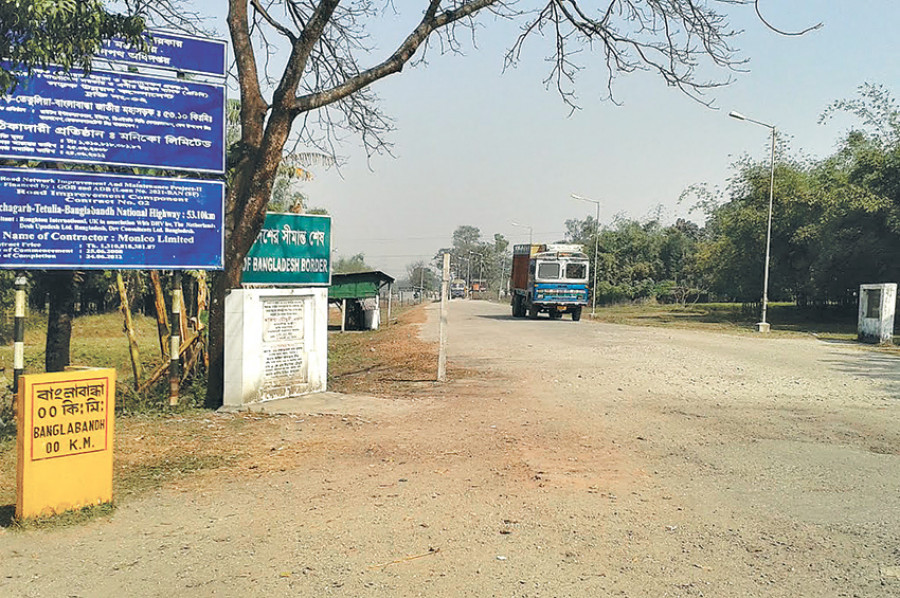National
Nepal, India, Bangladesh ‘agree’ to open transport routes in six months
Understanding is follow up to 2015 BBIN Motor Vehicle Agreement involving the three countries and Bhutan.
Prithvi Man Shrestha
Nepal, India and Bangladesh have agreed to open at least one or two transport routes for passenger vehicles under the banner of BBIN (Bangladesh, Bhutan, India and Nepal), a sub-regional initiative, in the next six months, a senior Nepali government official said.
A meeting of three countries on the BBIN Motor Vehicle Agreement on March 7-8 in New Delhi, where Bhutan participated as an observer, decided to go ahead with the plan to open the route(s) as pilot operation.
The meeting was held to discuss the Passenger and Cargo Protocols that are essential for implementing the BBIN Motor Vehicles Agreement (MVA) for the regulation of passenger, personal and cargo vehicular traffic between the four countries signed in June 2015.
This was the first meeting of the group since the outbreak of the Covid-19 pandemic two years ago. The last meeting was held in February 2020 in New Delhi.
“We have reached an understanding to operate the Kakarvitta- Kolkata-Dhaka or Biratnagar-Kolkata or both the routes in the next six months,” Keshav Kumar Sharma, joint secretary at the Ministry of Physical Infrastructure and Transport, told the Post over phone from New Delhi.
A study by the ADB has proposed 10 regional road networks as South Asian Corridors, out of which seven have been identified in the BBIN region.
But, the transport corridor will come into operation only after the countries involved give their official nod after conducting detailed studies on the matter.
“There will be two sub-committees in each country to study issues related to land transport and customs and making their recommendations, and a joint committee to finalise the operation modality,” said Sharma, who led the Nepali delegation during the latest meeting.
Sharma said that they have agreed to form sub-committees within a month and they are expected to give their reports by June. The sub-committees are expected to study technical aspects such as insurance, fees to be raised, insurance policy and things to be done when accidents occur, according to Sharma.
The Bhutanese parliament decided not to endorse the plan but in 2017 gave its consent for the entry into force of the Agreement among the three-member states (Bangladesh, India and Nepal) while refusing to commit to any obligation. Bhutan had shown its current infrastructure and environmental concerns for not allowing vehicles from other countries.
Bhutan's consent to the three countries to move ahead for the implementation of the agreement paved the way for the three countries to engage in further negotiations. During the latest meeting, further progress was made with regard to implementation of the agreement, according to officials.
According to a statement issued by India’s Ministry of External Affairs on Tuesday, an enabling Memorandum of Understanding (MoU) to be signed by India, Bangladesh and Nepal for the implementation of the BBIN MVA by the three countries, pending ratification of the MVA by Bhutan was finalised during the latest meeting.
Some of the key components of the Motor Vehicle Agreement are that member states would be permitted to operate their vehicles in each other’s territories for the transportation of cargo and passengers.
The sub-committees will work on the number of documents which need to be recognised mutually by each other's countries as per the article 1V of the MVA.
These documents include vehicle registration certificate, fitness certificate, insurance policy, permit, pollution certificate, driving licence and passport of the crew, proof of identity, visa, list of passengers in case of passenger vehicles and packing lists, and invoice among other things. The mutual recognition of these documents will be required to ensure seamless cross border transport.
When four countries had signed the BBIN MVA in June 2015, they had agreed on a six-month work plan from July to December 2015 for the implementation of the BBIN MVA. But seven years on these countries are still talking about ways to implement the MVA.
An early implementation of the BBIN MVA can shorten the transport routes, save travel time, and lower costs, in addition to reducing the carbon footprint, according to the World Bank. Its analysis finds that under the MVA, a truck travelling from Agartala in India’s northeast to Kolkata port will take 65 percent less time and the cost will be 68 percent cheaper.
According to a World Bank report, although trade between the BBIN countries grew six-fold between 2005 and 2019, the unexploited potential remains massive, estimated at 93 percent for Bangladesh, 50 percent for India and 76 percent for Nepal.




 9.89°C Kathmandu
9.89°C Kathmandu














